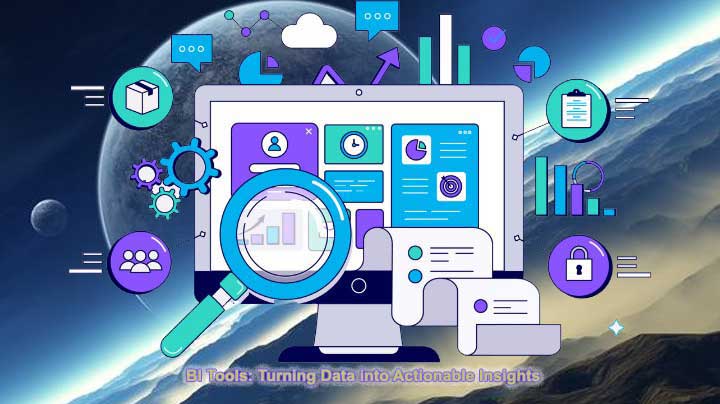BI Tools: Turning Data into Actionable Insights

Business intelligence (BI) tools are software applications that help businesses collect, analyze, and visualize data to extract meaningful insights.
Answer various business questions
BI tools can be used to answer a variety of business questions, such as:
What are my best-selling products?
Which customers are most likely to churn?
Where should I open my next store?
How can I improve my marketing campaign?
BI tools can help businesses make better decisions, increase efficiency, and reduce costs.
How BI tools can change data
Here are some ways BI tools can turn data into actionable insights:
Data visualization: BI tools can be used to visualize data in a variety of ways, such as charts, graphs, and maps. This can help businesses identify trends and patterns in their data that they might not otherwise see.
Data mining: BI tools can be used to mine data for insights that are not readily apparent.
For example, a BI tool might be used to identify which products are frequently purchased together or to identify which customers are most likely to purchase a particular product.
Statistical analysis: BI tools can be used to perform statistical analysis on data.
This can help businesses to test hypotheses about their data and draw conclusions about their data.
Machine learning: BI tools can be used to develop machine learning models.
These models can be used to predict future events or to classify data.
BI tools can be used by businesses of all sizes and in all industries. However, these tools can be complex and expensive, so it’s important to choose the right BI tool for your needs.
Real-world use of BI tools
Here are some examples of real-world use of BI tools:
Retailers: Retailers use BI tools to track sales performance, identify trends, and optimize their product mix.
Manufacturers: Manufacturers use BI tools to monitor production efficiency, identify quality control issues, and optimize their supply chains.
Healthcare: Healthcare providers use BI tools to track patient outcomes, identify trends, and improve the quality of care.
Finance: Financial institutions use BI tools to track market trends, assess risk, and make investment decisions.
BI tools are powerful tools that can help businesses of all sizes improve their performance.
By using BI tools, businesses can make better decisions, increase efficiency, and reduce costs.
Implement BI tools in your business
If you are thinking about implementing BI tools in your business, here are some tips:
Identify your specific needs: What specific BI goals do you have? What data do you need to analyze? What types of insights do you need to extract? Once you understand your needs well, you can start identifying BI tools that can help you achieve your goals.
Set a budget: BI tools can cost anywhere from a few hundred dollars to tens of thousands of dollars. It’s important to set a budget before you start shopping for BI tools.
Consider your technical expertise: Some BI tools are easier to use than others.
If you have limited technical skills, you may want to choose a BI tool designed for non-technical users.
Evaluate various BI tools: There are a variety of BI tools available, so it is important to evaluate the different tools before you make a purchase.
Consider each tool’s features, price, and ease of use.
Get trained: Once you choose a BI tool, it’s important to get trained on how to use it. This will help you get the most out of BI tools.
By following these tips, you can implem ent BI tools in your business and start reaping the benefits of BI.